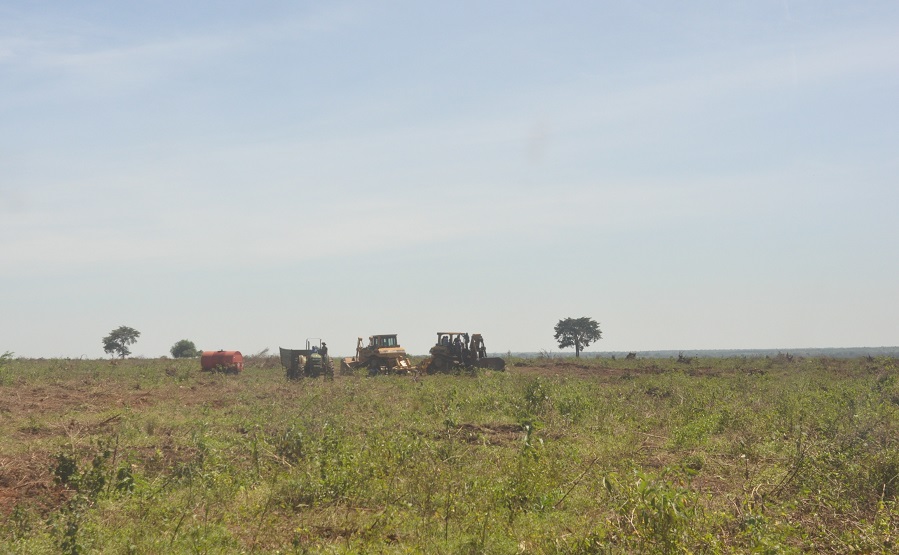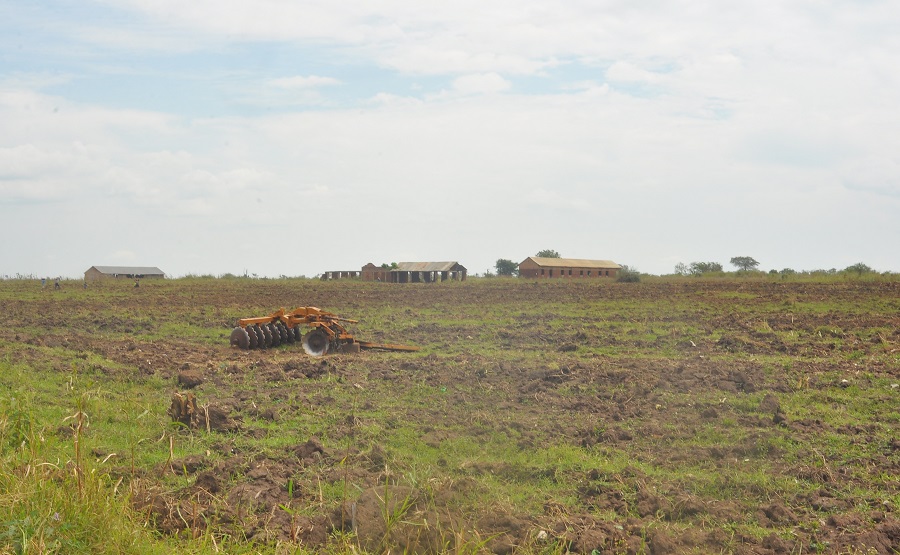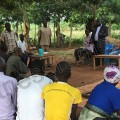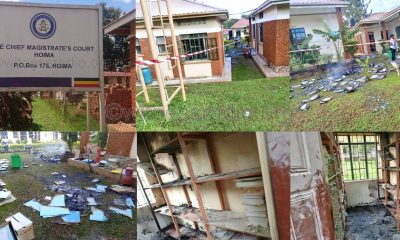DEFENDING LAND AND ENVIRONMENTAL RIGHTS
Multinationals use COVID-19 crisis to violently grab land of poor communities with impunity
Published
5 years agoon

Some of the bulldozers used to destroy people’s gardens in Kiryandongo
By witnessradio.org Team
Kiryandongo – Uganda – Despite the existence of government’s order stopping land eviction during the COVID-19 lockdown, three multinational companies with backing from state police, army and private security firms have intensified the use of violence to grab more land from poor communities with an unmistakably high level of impunity.
On 16th April 2020, the government of Uganda issued a notice to individuals and companies to halt land evictions of communities off their land. This followed a group of Kiryandongo District communities affected by actual or threatened forced evictions petitioning government, accusing multinational companies including Agilis Partners/Joseph Initiatives/Asili Farms; Kiryandongo Sugar Company and Great Seasons over what they called illegal and violent evictions being aided by Kiryandongi Police and Soldiers attached to 4th, Division of Uganda People’s Defense Force.
Companies have used the 35 days COVID-19 lock-down ending on May, 5th, 2020, with a possibility of extension with or without modification, to forcefully dispossess more than two dozens of smallholder farmers. They have been demolished houses belonging to affected communities and hundreds of acres of maize, sweet potatoes, cassava grown and owned by poor communities. Under the protection of state police, army and private security companies, the companies’ workers have used tractors to plow and demolish communities’ gardens without compensation. The communities have always depended on subsistence farming to feed families and meet basic needs.

Multinational companies including Agilis Partners/Asili Farms are dispossessing the poor communities in Kiryandongo to grow the same cash crops, like maize, as those of the displaced communities. They then convert the initially self sustaining and food secure poor communities into their laborers after depriving them of their means of livelihood and grabbing their most important asset: land. Agilis Partners/Asili Farms has benefited from financial assistance from Department for International Development (DFID), The United States Agency for International Development (USAID), Dutch Impact Investor DOB Equity and Dutch Trust Fund through Common Fund for Commodities. It is this money that they are using to disposes, displace and impoverish rural communities in Kiryandongo after compromising state machinery.
According to witnessradio.org independent research, individual community members whose properties have been destroyed, have at the same time been blocked by Kiryandongo district police leadership headed by Assistant Superintendent of Police (ASP) Joseph Bakaleke from opening up criminal cases against companies and their agents. While police blocks communities from reporting the criminal cases of torture, malicious damage to property, assault, threatening violence and other crimes, they happily arrest and detain residents on tramped charges by the said companies.
Some of the affected families include the family of Isingoma David, 85, lost 2 acres of sweet potato, a house, six acres of mixed fruit trees (mangos, oranges, avocados, guavas, jack fruit e.t.c; Baruma Sipiriano, which lost 3 houses and a toilet, 4 acres of growing maize, 2 acres of sweet potato, 38 stems of avocado trees; Majid Olaro lost 1.5 acres of cassava, 2 acres of growing maize, 1.5 acres of sweet potato; Munyansi Martin lost 11 acres of growing maize and Karegeya Wilson’s family, which lost 6 acres of banana plantation, 3 acres of growing maize, 4 acres of avocado trees and 13 mango trees were uprooted using a tractor among others.
According to Agarubanda Emmanuel, another victim whose pigsty was broken into by agents of companies and made off with 29 pigs and more killed at his property, said these attacks are carried out late in the night.
Related posts:

 Multinationals are using violence as weapon in the COVID-19 lockdown to dispossess communities
Multinationals are using violence as weapon in the COVID-19 lockdown to dispossess communities
 COVID-19 lockdown: Multinationals intensify violence against communities as court remains silent
COVID-19 lockdown: Multinationals intensify violence against communities as court remains silent
 COVID-19 Lockdown: Lawyers demand for court’s immediate intervention into the land grab violence meted out to communities by multinational companies in Kiryandongo
COVID-19 Lockdown: Lawyers demand for court’s immediate intervention into the land grab violence meted out to communities by multinational companies in Kiryandongo
 …….Special Report; abridged testimony……. ABDUCTION AND TORTURE: New methods used by multinationals and security agencies to grab land from the poor communities…
…….Special Report; abridged testimony……. ABDUCTION AND TORTURE: New methods used by multinationals and security agencies to grab land from the poor communities…
You may like
-


Hoima Court fire: Witness Radio is dreaded as evidence in lawsuits filed against high-profile individuals could have been destroyed.
-


Six cattlemen opposed to the Tilenga oil project-related forced land eviction have been granted bail but will remain in prison…
-


Community land rights defenders that have been on trial since 2020; are set to return to court this January.
-


UNFSS loses significance as critical issues affecting smallholder farmers are not mentioned – Criticized by Rights groups and experts
-


Global agribusiness continues to displace rural communities
-


The global farmland grab goes green
DEFENDING LAND AND ENVIRONMENTAL RIGHTS
Crackdown on EACOP protesters intensifies: 35 Activists arrested in just four months.
Published
2 months agoon
April 30, 2025
By Witness Radio team.
Ugandan authorities’ ongoing crackdown on anti-EACOP protest marches is spreading rapidly like wildfires. The East African Crude Oil Pipeline (EACOP) Project, a significant oil infrastructure development, has been a point of contention. Recently, Witness Radio warned that criminalizing the activities of individual activists and environmental defenders opposed to this project, which aims to transport crude oil from Hoima in Uganda to the Port of Tanga in Tanzania, will be regarded as the most disastrous and insensitive to communities’ concerns in Uganda’s history.
In just four months, a series of arrests targeting environmental activists opposing the mega oil project that transports crude oil from Hoima in Uganda to the Port of Tanga in Tanzania has resulted in a scene of crime. No one is allowed to express their concerns peacefully about it and push back on its adverse negative impacts.
While activists view the peaceful marches as a rightful and brave effort to protect the environment and the communities affected by the project, the authorities, including the Uganda police and Prosecutor’s office, regard these actions as attempts to sabotage development projects and resort to criminalization.
Activists and civil society organizations’ reports indicate that the project will likely damage the environment and has displaced thousands of local communities in Uganda and Tanzania.
Despite growing concerns and an intensified crackdown, project financiers and shareholders remain unwavering in supporting the EACOP project. This steadfast support underscores the urgency of the situation. However, environmental and human rights defenders stand firm, resolutely demanding the project’s halt, showing a glimmer of hope in this challenging situation.
Over last weekend, eleven (11) environmental activists were arrested, charged, and sent to prison. They were arrested and detained by police at Kenya Commercial Bank (KCB) premises while attempting to deliver a petition urging the bank to halt its financial support for the 1,444-kilometer heated pipeline project.
The arrest of the eleven activists comes less than a month after nine activists were detained on April 02 outside the Stanbic Bank headquarters while attempting to deliver a petition urging the bank to halt its funding for the project.
The eleven include Bob Barigye, Augustine Tukamashaba, Gilbert Ayebare, Umar Kasimbe, Joseph Ssengozi, Keith Namanya, Raymond Bituhanga, Mohammed Ssentongo, Paul Ssekate, Misach Saazi and Phionah Nalusiba.
KCB Bank Uganda is one of the banks that recently joined the race to fund the EACOP project. Last month, On March 26, 2025, EACOP Ltd., the company in charge of the construction and future operation of the EACOP project, announced that it had acquired additional financing provided by a syndicate of financial institutions, including regional banks such as KCB Bank.
Other banks in the syndicate include the Stanbic Bank Uganda, the African Export-Import Bank (Afreximbank), the Standard Bank of South Africa Limited, and the Islamic Corporation for the Development of the Private Sector (ICD).
The activists appeared before the Nakawa Chief Magistrate Court on April 25. They were charged with criminal trespass. According to section 302 of the Penal Code, a person convicted of criminal trespass is liable to a maximum sentence of one year in prison. This detail underscores the weight of the situation.
The activists are currently on remand at Luzira Maximum Prison and are expected to appear again before the court on May 08, 2025, for mention.
Related posts:

 The latest: Another group of anti-EACOP activists has been arrested for protesting Stanbic Bank’s financing of the EACOP Project.
The latest: Another group of anti-EACOP activists has been arrested for protesting Stanbic Bank’s financing of the EACOP Project.
 Another group of eleven environmental activists have been charged with common nuisance and remanded to Luzira Prison for opposing the EACOP project.
Another group of eleven environmental activists have been charged with common nuisance and remanded to Luzira Prison for opposing the EACOP project.
 Breaking: Eight (8) environmental activists have been arrested by police over protesting against the EACOP project.
Breaking: Eight (8) environmental activists have been arrested by police over protesting against the EACOP project.
 Breaking: 15 Anti-EACOP Activists Arrested in Kampala While Marching to Parliament
Breaking: 15 Anti-EACOP Activists Arrested in Kampala While Marching to Parliament
DEFENDING LAND AND ENVIRONMENTAL RIGHTS
Witness Radio Petitions ODPP urgently to review and withdraw criminal charges against Buvuma Community Land Defenders.
Published
3 months agoon
April 14, 2025
By Witness Radio team.
As Ugandan courts increasingly become tools of oppression, Witness Radio is deeply concerned about the growing trend of weaponizing the justice systems against communities, land, and environmental defenders who resist land grabbing and other harmful land-based investments.
In a well-calculated tactic, land grabbers and investors continue to collude with security agencies, particularly the police, to arrest violently and courts of law to maliciously prosecute hundreds of these defenders for either fighting back against the land-grabbing schemes or criticizing harmful land-based investments in Uganda.
This trend of persecution is not isolated to Buvuma but is a continuous threat in many other parts of Uganda. Buvuma, in particular, is a hotbed of injustice, where the government of Uganda, in collaboration with BIDCO, is implementing the National Oil Palm Project (NOPP) to expand palm oil growing in Uganda.
In our article dated March 5th this year, Witness Radio revealed how community land defenders in Buvuma continued to face judicial harassment on trumped charges simply for defending their land from being grabbed for palm oil plantations.
The accused defenders are residents of the Magyo and Bukula villages in the Buvuma district.
More than a dozen smallholder farmers in these villages situated in Nairambi Sub-county are facing violent evictions from their land and unending persecution. They have been framed with criminal charges for refusing to give away their land for palm oil growing.
The victims are legal owners of bibanja duly registered by Buganda Land Board and recognized as tenants by Buganda Land Board.
Buvuma College school is claiming ownership of the land, while Buvuma district officials, under the guise of protecting Kirigye Forest Reserve, also claim the same land on which these individuals have settled lawfully for decades.
Several community members have been arrested and charged with false criminal offenses.
Among them include community land rights defender Ssentongo, who is currently battling with cases CRB:301/2023, accused of illegally occupying Kirigye forest land (offense of carrying out prohibited activities in forest reserve).
CRB 232/2024 with complainant Kabale Denis (District Forest Officer) charged with carrying out prohibited activities in the forest reserve and CRB 098/2023 on criminal trespass with Buvuma College administration, the complainant.
Others facing persecution are Steven Kyeswa, Kisekwa Richard, and Kibondwe Chrysostom on CRB 141/2024 with assault occasioning actual bodily harm vide Criminal Case No 075 of 2024, among other cases.
As part of efforts to end the ongoing oppression of community defenders in Buvuma, Witness Radio has petitioned the Office of the Director of Public Prosecutions to urgently intervene, review, and withdraw the charges unjustly brought against these defenders.
According to the petition dated March 7th, 2025, the sole intention of these charges is to grab community land without any merits as criminal charges. Sarah Adong, one of the staff attorneys and Head of Witness Radio Legal Aid, reveals that the matters against the accused persons before the court point to the question of land ownership, which can only be answered through civil suits and not criminal charges. It is an apparent injustice.
“Upon thoroughly examining the facts, evidence, and circumstances surrounding these charges, it is evident that they have no merit whatsoever. They amount to vexatious and frivolous prosecution that serves no genuine interest of justice,” the petition by the Land and Environmental Rights Watchdog mentioned.
In an unusual turn of events, the Witness Radio Legal Aid team observed that some of the defenders, including Sentongo, have been charged with criminal trespass twice by the same complainant vide CC No 325 of 2020 and are now facing the same charge by the same party vide CC No 062/2023. This repeated persecution is a heavy burden on these defenders.
“The charges against our client undermine the accused person’s rights under Article 29 (9) of the Constitution of the Republic of Uganda. It has proven that the cases brought against our clients are frivolous and vexatious as they are instituted in a manner that constitutes abuse of court processes,” the petition further read.
Therefore, the organization strongly urges the office of the DPP to exercise its prosecutorial discretion under relevant legal provisions. This is crucial for the prevalence of equity, justice, and good conscience and reaffirming the prosecution process’s integrity and objectivity.
Related posts:

 Witness Radio petitions chief prosecutor: Want 34 community land rights defenders and activists released from prison.
Witness Radio petitions chief prosecutor: Want 34 community land rights defenders and activists released from prison.
 Palm Oil project investor in Landgrab: Witness Radio petitions Buganda Land Board to save its tenants from being forcefully displaced palm oil plantation.
Palm Oil project investor in Landgrab: Witness Radio petitions Buganda Land Board to save its tenants from being forcefully displaced palm oil plantation.
 Court charges and remands two community land rights defenders and eight farmers to prison
Court charges and remands two community land rights defenders and eight farmers to prison
 Uganda: Targeting community land and environmental defenders with criminal offenses is rising as two community land rights defenders arrested in a hotspot district of forced land evictions.
Uganda: Targeting community land and environmental defenders with criminal offenses is rising as two community land rights defenders arrested in a hotspot district of forced land evictions.
DEFENDING LAND AND ENVIRONMENTAL RIGHTS
Milestone: Another case against the EACOP activists is dismissed due to the want of prosecution.
Published
3 months agoon
April 8, 2025
By Witness Radio team.
The Buganda Road Chief Magistrate has dismissed another case against 20 anti-EACOP activists due to want of prosecution.
Yesterday, on April 7, 2024, her worship, Jalia Basajjabalaba, dismissed the case against the 20 activists. The case was dismissed after the state failed to produce witnesses pinning the activists on a common nuisance charge after close to 9 months of case trial.
On August 26, 2024, the 20 activists, including Pitua Robert, Okwai Stephen, Kothurach Margret, Omirambe Moses, Owonda Rogers, Alimange Joseph, and Wabiyona Wicklyf, among others, were arrested while peacefully marching to the Ministry of Energy to deliver a petition opposing EACOP and other oil projects. On August 27, 2024, they were arraigned before Court and charged by the Buganda Road Magistrate with common nuisance.
After nearly nine months of trial, the state failed to present a single witness, prompting the magistrate to close the case file.
Although the case against the activists has been dismissed, they remain deeply dissatisfied with the continued pattern of arrests and charges, which often collapse in Court due to a lack of evidence.
Bob Barigye, one of the activists whose case was dismissed, expressed concern over what he described as deliberate attempts to frustrate and silence voices critical of the EACOP project.
“We are saddened that it was just dismissed after eight months of pacing up and down to Court.
We are disappointed that the magistrate did not award us any cost or compensation for the dismissed case, meaning that the state failed to prove that we were a public nuisance and that we were citing violence as activists. Many of us have been forced to travel long distances from our villages to attend court sessions in Kampala — only for the state to produce no evidence against us. It’s a clear waste of our time, energy, and resources. But beyond that, it’s an attempt to discourage us from speaking the truth about the dangers of the EACOP project,” Barigye said.
Barigye added that the activists are already engaging their lawyers to explore further legal remedies in higher courts, demonstrating their unwavering commitment to justice and their cause.
“It is frustrating and deeply disappointing that we are dragged to Court and disrespected every time we stand up against this deadly pipeline, the East African Crude Oil Pipeline (EACOP). But we were ready to face this battle in Court because we knew we had committed no crime by delivering a petition,” Barigye said, expressing the activists’ exasperation with the legal process.
Shortly after their last Court appearance on February 20, the 20 accused activists, during a press briefing, demanded that the judiciary stop delaying hearings of their case related to the EACOP project and called for the dismissal of their case if the Court lacks sufficient evidence to prosecute them.
“The courts of law should not be used as tools of oppression. They should not waste any time. If we have a case to answer, let them prosecute us on April 7, which they have scheduled. If they fail again, they should dismiss the case instead of wasting our time and resources,” the activists emphasized, reiterating their demand for a fair and expedited legal process.
This is the second milestone achieved by the Stop EACOP activists in less than two months in their continued campaign against the EACOP pipeline. In February 2025, the Court also dismissed a common nuisance case against the 15 EACOP activists due to the lack of prosecution.
“The state doesn’t present a single witness in all the cases that have always been preferred against us. No witnesses have come along to say that these people were unruly. As activists, we want to investigate this further and go to the Constitutional Court to learn what constitutes a nuisance. Whoever is demonstrating peacefully is arrested and charged with a public nuisance. This charge is coronial and very demeaning. We want to go ahead and challenge this,” Barigye revealed, outlining the activists’ proactive plans to challenge the charge of public nuisance.
The EACOP project has long been controversial, with environmental activists arguing that it poses a significant environmental risk and has already left a trail of human rights abuses in the communities hosting it in Uganda and Tanzania.
The EACOP is a 1,443-kilometer heated pipeline transporting crude oil from Hoima, Uganda, to Tanga, Tanzania. The first 296 kilometers run through Uganda, while the remaining 1,147 kilometers pass through Tanzania. The project is a joint venture between TotalEnergies, the Uganda National Oil Company (UNOC), the Tanzania Petroleum Development Corporation (TPDC), and the China National Offshore Oil Corporation (CNOOC).
Related posts:

 Another group of eleven environmental activists have been charged with common nuisance and remanded to Luzira Prison for opposing the EACOP project.
Another group of eleven environmental activists have been charged with common nuisance and remanded to Luzira Prison for opposing the EACOP project.
 Breaking: The Bail Application for the 15 EACOP Activists flops for the second time, as the trial magistrate is reported to have been transferred.
Breaking: The Bail Application for the 15 EACOP Activists flops for the second time, as the trial magistrate is reported to have been transferred.
 Breaking: Buganda Road Court grants bail to 15 stop EACOP activists after 30 days in prison.
Breaking: Buganda Road Court grants bail to 15 stop EACOP activists after 30 days in prison.
 EACJ’s Appellate Court will hear an appeal on the dismissed Case against EACOP development.
EACJ’s Appellate Court will hear an appeal on the dismissed Case against EACOP development.

Activism on Trial: Despite the increasing repressive measures, Uganda’s EACOP protesters are achieving unexpected victories in the country’s justice systems.

Communities Under Siege: New Report Reveals World Bank Failures in Safeguard Compliance and Human Rights Oversight in Tanzania

A decade of displacement: How Uganda’s Oil refinery victims are dying before realizing justice as EACOP secures financial backing to further significant environmental harm.

Carbon Markets Are Not the Solution: The Failed Relaunch of Emission Trading and the Clean Development Mechanism

A decade of displacement: How Uganda’s Oil refinery victims are dying before realizing justice as EACOP secures financial backing to further significant environmental harm.

Govt launches Central Account for Busuulu to protect tenants from evictions

Activism on Trial: Despite the increasing repressive measures, Uganda’s EACOP protesters are achieving unexpected victories in the country’s justice systems.

Despite harsh repression, opposition to the EACOP pipeline in Uganda remains strong

Innovative Finance from Canada projects positive impact on local communities.
Over 5000 Indigenous Communities evicted in Kiryandongo District
Petition To Land Inquiry Commission Over Human Rights In Kiryandongo District
Invisible victims of Uganda Land Grabs
Resource Center
- LAND GRABS AT GUNPOINT REPORT IN KIRYANDONGO DISTRICT
- RESEARCH BRIEF -TOURISM POTENTIAL OF GREATER MASAKA -MARCH 2025
- The Mouila Declaration of the Informal Alliance against the Expansion of Industrial Monocultures
- FORCED LAND EVICTIONS IN UGANDA TRENDS RIGHTS OF DEFENDERS IMPACT AND CALL FOR ACTION
- 12 KEY DEMANDS FROM CSOS TO WORLD LEADERS AT THE OPENING OF COP16 IN SAUDI ARABIA
- PRESENDIANTIAL DIRECTIVE BANNING ALL LAND EVICTIONS IN UGANDA
- FROM LAND GRABBERS TO CARBON COWBOYS A NEW SCRAMBLE FOR COMMUNITY LANDS TAKES OFF
- African Faith Leaders Demand Reparations From The Gates Foundation.
Legal Framework
READ BY CATEGORY
Newsletter
Trending
-

 SPECIAL REPORTS AND PROJECTS1 day ago
SPECIAL REPORTS AND PROJECTS1 day agoActivism on Trial: Despite the increasing repressive measures, Uganda’s EACOP protesters are achieving unexpected victories in the country’s justice systems.
-

 NGO WORK1 week ago
NGO WORK1 week agoCommunities Under Siege: New Report Reveals World Bank Failures in Safeguard Compliance and Human Rights Oversight in Tanzania
